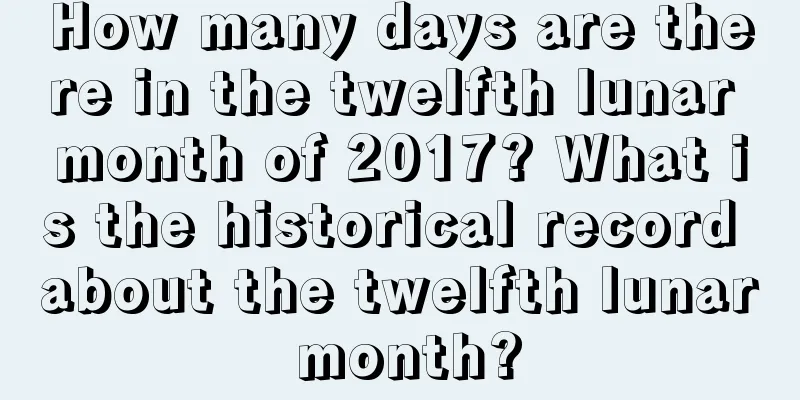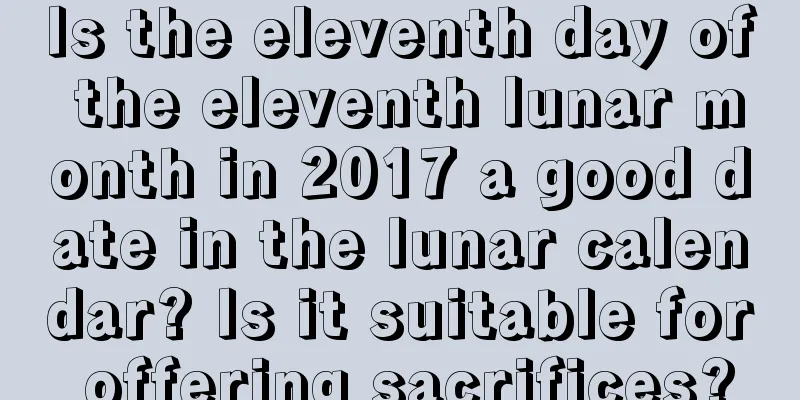How many days are there in the twelfth lunar month of 2017? What is the historical record about the twelfth lunar month?

Introduction: The twelfth lunar month is the last lunar month in our country. So how many days are there in the twelfth lunar month in 2017? What is the historical record about the twelfth lunar month? Let’s follow the editor to find out! The twelfth month of the lunar calendar is a month for sacrifices, and there are many festivals that deserve our attention. What should we do during these festivals? The Fortune Teller website has the answer for you.How many days are there in the twelfth lunar month of 2017?The twelfth lunar month of 2017 is from January 17, 2018 to February 15, 2018. 30 days in total.The twelfth month of the lunar calendar is also known as the twelfth month or the wax month. There are many traditional folk activities during the twelfth lunar month. This title has little to do with the natural seasons, but is mainly related to the annual sacrifices. The so-called "La" was originally the name of the sacrifice at the end of the year. Han Ying Shao's "Customs and Meanings" said, "In the Xia Dynasty, it was called Jiaping; in the Yin Dynasty, it was called Qingsi; in the Zhou Dynasty, it was called Da La; and in the Han Dynasty, it was changed to La. La means hunting, which refers to hunting animals to sacrifice to the ancestors." Or it is said, "La means connection, the connection between the new and the old, so a big sacrifice is held to reward the merits." Whether it is offering animals to ancestors after hunting, or worshiping gods at the turn of the old and the new, sacrificial activities are still required, so the twelfth lunar month is a month for sacrifice. What is the historical record about the twelfth lunar month?"Qionglin of Stories for Young Learners" Volume 1: Seasons and Seasons <br /> The Qin people called the year-end sacrifice to the gods La, so the twelfth month is still La today. The taboo word for the emperor in his time was "Zheng", so to this day the first month of the lunar calendar is pronounced "Zheng".In ancient times, the Qin people used hunted animals to sacrifice to their ancestors at the end of the year, which was called La. Therefore, the last month of the lunar calendar is called La Yue to this day. Qin Shi Huang's name was Zheng (Qin Shi Huang's name was Ying Zheng). In order to avoid the emperor's name, the "zheng" in the first month of the lunar calendar is still pronounced as "zheng". Records of the Zhou Dynasty <br /> As early as the Zhou Dynasty, no matter whether it was the family of an official or a commoner, a "year-end sacrifice" was held at the end of the year. The scale of this sacrifice was the largest in the year. The name of this sacrificial activity was called "La", as evidenced by many ancient books: "Yuzhu Baodian": "La is the great sacrifice of the year." "Duduan": "La is the great sacrifice at the end of the year." "Jingchu Sui Shi Ji": "The reason why Confucius participated in the La Festival is that this festival is the most important in the year." The Book of Rites "The Book of Rites. Monthly Ordinances" states: "In the first month of winter, the families perform the five sacrifices to their ancestors." The objects of the La sacrifice are the ancestors and five household gods. The five household gods refer to the door, household door, skylight, stove, and land inside the door. People offer various kinds of sacrifices reverently to thank their ancestors and household gods for their blessings and to pray for good weather, good harvests, thriving livestock, and good health for the whole family in the coming year. Other records <br /> Regarding the time of La Festival, it has been fixed in December since the Zhou Dynasty. As for which day in December, there is no clear record in the documents before the Qin Dynasty. After the Han Dynasty, emperors of different dynasties set the date on a certain day of the twelfth lunar month based on the theory of the Five Elements. Some set the date on a certain day of Chen, and some set it on a day of Xu. Emperor Wu of Liang, the founding emperor of the Liang Dynasty during the Northern and Southern Dynasties, set the La Day Festival on the eighth day of the twelfth lunar month. This was related to his devout belief in Buddhism, because the founder of Buddhism, Sakyamuni, attained enlightenment and became a Buddha on this day. People sincerely combined the two into one and offered sacrifices to their ancestors, gods and Buddhas at the same time. Summary: Through the above article we know about [How many days are there in the twelfth lunar month of 2017? What is the historical record about the twelfth lunar month? 】Problem analysis, hope it can help everyone! |
Recommend
If you want to have a baby in the third month of the lunar calendar in 2021, when will you give birth? If you want to get pregnant in the third month of the lunar calendar, when will you give birth?
The third month of the lunar calendar is the third...
Is Xiaohan a good day? What is the origin of the Minor Cold solar term?
The arrival of Xiaohan also means the beginning of...
Will the Civil Affairs Bureau be open on the 13th day of the first lunar month in 2019? Is it suitable to apply for a marriage certificate?
Marriage is the top priority in life, and choosing...
Is it a good idea to open on the ninth day of the eighth lunar month in 2019? Is it an auspicious day?
No matter what you do, the first thing is to see ...
Query of auspicious time on June 24, 2019, and query of auspicious and unlucky time
The wind and rain in June, drop by drop, hit the ...
The most romantic words to express your love on Chinese Valentine's Day. Is it okay to propose on Chinese Valentine's Day in 2020?
Introduction: The Chinese Valentine's Day is a...
What are the do's and don'ts on September 17th of the lunar calendar in 2021? Can I pick up a new car?
"The swallows bid farewell and the swans fly ...
Is March 3rd, 2019, a suitable day for ancestor worship? Is it a good day to visit graves on March 3rd?
Introduction: In our country’s traditional culture...
Is April 26th of the lunar calendar 2021 an auspicious day? Is it suitable to go to a 4S store to pick up a new car?
Sophora japonica flowers bloom in April, so it is ...
What is the difference between Double Ninth Festival and Qingming Festival? Why can't we say Happy Holidays on Double Ninth Festival?
Almost every month has different festivals and sol...
My husband is a sheep and I am a monkey. Is it okay if we have a baby dog this year?
Introduction: Babies of different zodiac signs hav...
Is the third day of the ninth lunar month in 2021 a good day to worship ancestors? Can I worship my ancestors?
There are certain theories about the choice of tim...
Detailed explanation of common Feng Shui problems in factories and specific solutions
Introduction: We often ask ourselves, why can’t w...
2017 Leap June 10th Hour Auspicious and Unlucky Query, Hour Auspicious and Unlucky Query
The Fortune Teller website has carefully compiled...
In which direction is the God of Wealth on the 26th day of the first lunar month in 2020?
In which direction is the God of Wealth on the 26...









